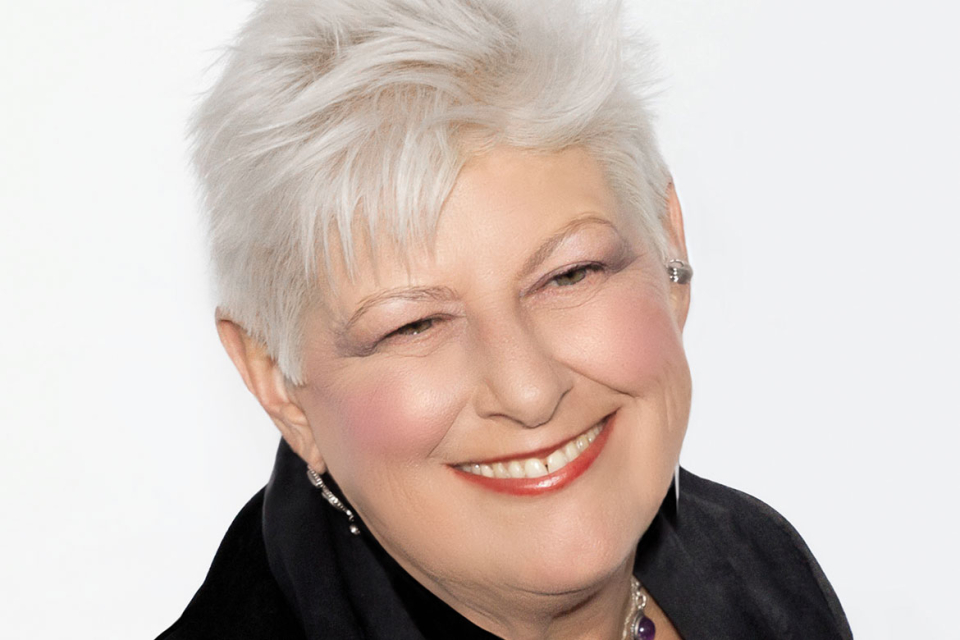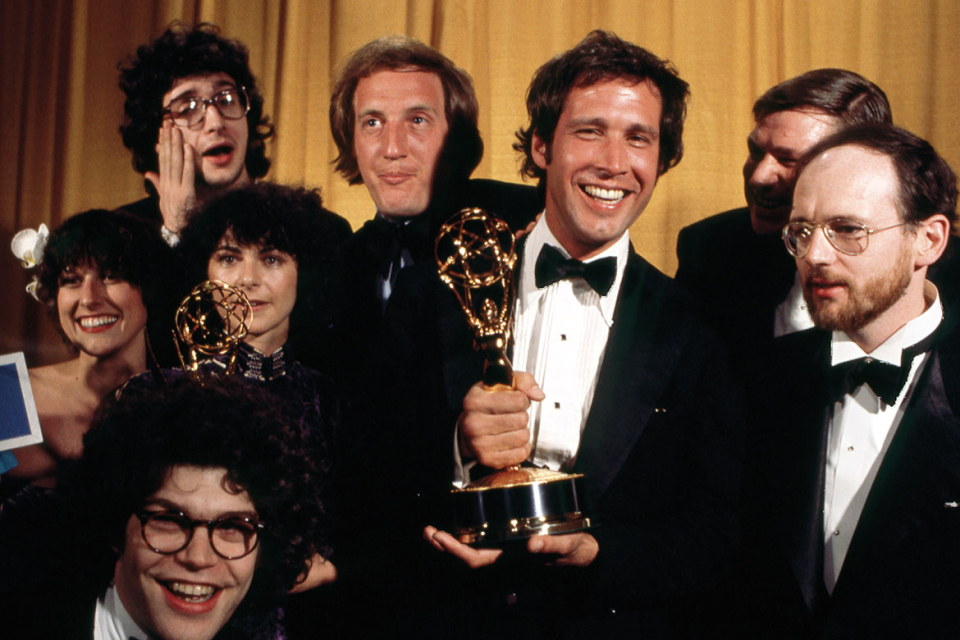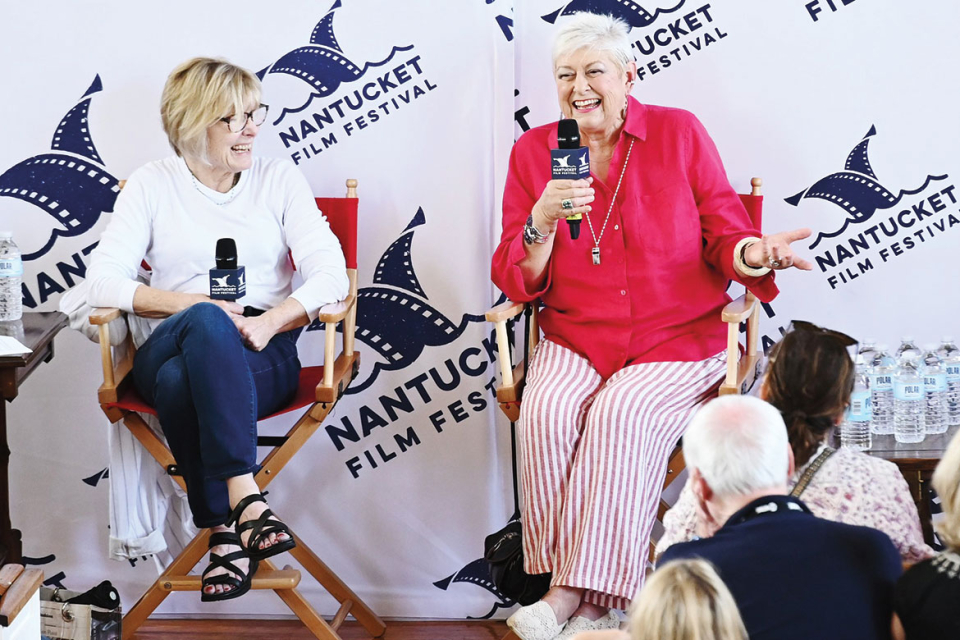Growing up in Buffalo, New York, a young Anne Beatts would take trips to New York City and would dream of staying. Her career path, starting at the parody magazine National Lampoon, made that dream a reality, as she became one of the few women writers hired at the creation of NBC's Saturday Night Live. At the time of her passing in 2021, NPR's Scott Simon said of her: "Because Anne Beatts never quite fit in to the guys' comedy room, she created her own, and kicked open the door for others."
Beatts explained that she felt a special responsibility to write for the women members of the Not Ready for Prime Time Players. She and fellow SNL writer Rosie Shuster created "The Nerds" series of sketches, which portrayed the awkward yet adorable relationship between Gilda Radner (as Lisa Loopner) and Bill Murray (as Todd DiLaMuca). Beatts went on to create equally likable nerdy characters in the CBS show Square Pegs, which had a lasting influence despite its short run.
Beatts worked on a number of different television titles in the decades following SNL, producing the first season of The Cosby Show spinoff A Different World between 1987 and 1988. Later in life, she served as an adjunct professor at Chapman University's Dodge College of Film and Media Arts. She also taught writing for film and television at the University of Southern California School of Cinematic Arts and the Department of Cinema and Television Arts at California State University, Northridge.
She was nominated for an Emmy six times for her work as a writer on SNL and won in 1976 and 1977. She was interviewed in May 2009 by Jim McKairnes for The Interviews: An Oral History of Television, a program of the Television Academy Foundation. The following is an edited excerpt of their conversation. The entire interview can be screened at TelevisionAcademy.com/Interviews.
Q: Was there a lot of humor growing up in your house?
A: It was a quality that was prized in my family. My father told a lot of jokes and stories; both of my parents read out loud to us. I learned to read when I was about three — in self-defense, my mother always said — because everybody else was reading a book, so I needed to find something to do.
Q: You ended up at McGill University in Montreal. What was your major?
A: English. I was fifteen when I started college because I had skipped a bunch of grades. I didn't really want to go to college, but I didn't have much of a choice because I was too young to get married or join the army.
Q: How did you end up at National Lampoon?
A: I started working in advertising for a small boutique agency in Montreal, and my friend fixed me up on a blind date with a guy named Michel Choquette. Michel was going to New York to meet with these guys who were starting a magazine [National Lampoon]. I started dating Michel, and then I started helping him with his work. Michel brought me to New York and started bringing me around the Lampoon.
Q: What was it like to work at the Lampoon?
A: It was hard to get anybody to acknowledge me for quite a while because they were so terrified of women. Women were like a different breed to them, like horses or something. They had these editorial dinners, and the contributing editors would get a free dinner and you were supposed to toss around ideas. Michel would bring me. Nobody really wanted me there, but they couldn't say, "Make her go home."
Then, after the dinners, they would go, "Whose idea was that?" And it would turn out it was my idea, so I sort of wormed my way into the magazine.
I think the defining moment for me was when we all went out to dinner at this Armenian restaurant called Sayat Nova. After we'd all agreed that it was the worst Armenian restaurant in New York City, and possibly anywhere outside of Armenia, somebody said, "What do you think it means, Sayat Nova?"
And I said, "Hello, sucker."
And people were like, "What?" It was like the table spoke.
And I thought, "Hmm, I could do this."
Q: How did you meet Michael O'Donoghue?
A: I sort of changed boyfriends mid-magazine from Michel to Michael, and then Michael and I were living together.
Q: How did you end up writing for Saturday Night Live?
A: I was working on a book, Titters: The First Collection of Humor by Women. Lorne Michaels came along and came to dinner and hired Michael and then expressed an interest in hiring me, and I turned the job down.
Q: Why?
A: Because I was doing the book. I couldn't do both, and I didn't really want to work in television. Television to me was like a lava lamp with sound, it was all very nice, but it wasn't something I actually wanted to do.
Q: What changed your mind?
A: Lorne sort of lied and told me that I wouldn't have to work that hard, and I could do the book as well. I don't take any great credit for how much he wanted me to take the job. I just think there weren't that many women in comedy at the time, and I was at the top of a very short list in New York City.
I had by then discovered women's liberation. I had a very combative interview with Lorne. It was the only time in my life where I was late to see Lorne — I was getting my hair permed, and it didn't take and had to be redone. I kept calling and saying, "I'll be there in an hour," and then I finally showed up, and of course, he kept me waiting.
I went in and had this meeting with him where I told him that I didn't like The Lily Tomlin Special [which Lorne was a writer on], that I preferred The Sonny & Cher Comedy Hour. I was very obnoxious, and surprisingly, he still wanted to hire me. A friend of mine said, "This is an offer you can't refuse; you have to take this job, and if you don't take it, you'll regret it." She was right; I would have regretted it. Between the two of them, I decided I had to take the job.
Q: How did the show develop between the writers and Lorne?
A: It was an unusual show in that the writers were hired first — there was no talent attached to the show. Also, there was this huge pre-production period because we started right after the July 4th weekend, 1975. We went up to 30 Rock, we had offices, we started. We didn't have auditions until at least August. It created this environment where people could get to know each other and throw ideas around, which was quite brilliant of Lorne to do, and which he was enabled to do by Dick Ebersol [then NBC's director of weekend late night programming].
Q: What memories do you have of The Not Ready for Prime Time Players?
A: There were certain people that Lorne knew that he wanted — Gilda [Radner], and Danny [Aykroyd] — and he didn't want to hire John [Belushi], 'cause he said John would be trouble. He was right; he was trouble. But he was so brilliant. Michael and I really persuaded Lorne to hire John. Michael and John became friends, John and Judy [Belushi] were our friends, and Judy was working on Titters as the art director.
Q: Was there a certain specialty that you had on the show?
A: Rosie Shuster and I collaborated a lot. We would always feel the responsibility to make sure that "the girls" in the cast, as they were known, had their own pieces.
Q: Talk about working with Belushi.
A: I had a complex relationship with Belushi because initially I did feel very protective of him, and thought of him as this sweet pussycat guy that would come over to our house and tell stories and do impressions of people. But then Belushi got adversarial about the women on the show, I think partly because he resented the fact that I was working with his wife, and she was spending a lot of time on our project. It became a lot more difficult and complicated. But I think he was really a genius.
Q: Not much is written about Garrett Morris and his relationship with the writers.
A: He was hired as a writer, too. He was a playwright. I think Garrett had a very difficult position on the show. We owe him and every African American in the country an apology for making him be a flying monkey [in a Wizard of Oz sketch]. He was older, he wanted to write, but I don't think his writing adapted itself well to that situation, which was true of a lot of people. He was kind of isolated, so I think he had a very tough situation.
Q: What was it like working with Lorne Michaels?
A: I always thought that Lorne was kind of like the Jewish mother who in the joke gives her son two shirts, a red shirt and a blue shirt, then he wears the red shirt to Friday night dinner, and she says, "What's the matter? You didn't like the blue one?" Lorne's praise was not easily won.
Q: But a good boss?
A: He did an amazing thing — he assembled an amazing group of people.
Q: What do you think made Saturday Night Live so different?
A: It was back in a day when people didn't approach comedy as a potential career choice. They did it because they couldn't get a real job, and they hated getting up in the morning. Lorne once said that Saturday Night Live was a great sandbox, and it was. You had the opportunity to play at the network's expense. Not very great expense, but you could really take your fantasies and see them acted out on television.
Q: How did Square Pegs come about?
A: I got an agent, Frank Cooper, and he thought I could sell a sitcom. He said, "You must have been popular in high school?"
And I said, "Oh no, I was a total square peg in high school. I was a nerd. I was not popular at all."
And he said, "Why don't you do something about that?"
I worked it out and went into this pitch meeting at CBS, and the only reference point that I had was The Many Loves of Dobie Gillis, which I had watched in high school. I went in and Dobie Gillis was in the room — Dwayne Hickman [who played Dobie] was working as an executive at CBS, which was really kind of odd. It was some sort of omen. I pitched this idea, and Frank had also set up a meeting at NBC for the next morning. I was at the Chateau Marmont getting ready for the NBC meeting and got a phone call from Frank and the CBS executives wanting to know more about the show. "Would it have to be sex, drugs and rock and roll because it was a show about teenagers?"
I said, "No, the heroines of the show — based on myself and my best friend in high school — aspired to these things rather than experienced them."
They bought the show, we canceled the meeting at NBC, and I went back to bed. But I wasn't prepared for the environment of Hollywood.
Q: You mean network interference?
A: It was more production company interference than network interference. There was no expectation that I would be a hands-on producer, and when I was, they were very resistant. The network executives were extremely supportive, but I was in constant battle with the production company. It was the only filmed show that they did, so there were surprising costs that they weren't happy with.
Q: How did Sarah Jessica Parker come to be involved with Square Pegs?
A: She was the first person that came in to read. The casting director, Eve Brandstein, who I've worked with creatively since then — she transitioned to producer — was in her last year of casting, and we did a nationwide search. Sarah was in New York. She came in to read, and I thought she was good, but I said, "No, she's too pretty."
Eve said, "Wait a minute."
She had some sunglasses and knocked the lenses out and put them on Sarah and made her read again. But you don't rent the first apartment you look at — she was the first person that read for the role, so we brought her back a lot of times, poor girl, before finally deciding that she was the absolute right person.
Q: How did you go about assembling your writing staff for the show?
A: I hired people I had worked with who were new to television. I also, rather unusually, hired all women. I felt like they were writing about girls in high school, and they needed to be people who had been girls in high school. The network made me hire Andy Borowitz — he was the token guy — he used to call himself Tootsie Borowitz. That was a total reversal of the usual situation.
Q: What do you think the legacy of the show is?
A: I think it was very influential on almost any other show done about high school students — My So-Called Life, Head of the Class, Popular — any of those shows, Square Pegs had an influence.
Q: Have you watched Saturday Night Live through the years?
A: I teach in the film division of USC, and I created a course on writing for late-night television, so of course I have to watch Saturday Night Live.
Q: How does it compare?
A: I'm really happy that it's still around. In the early years I thought, "If we're not there, they shouldn't be doing it." Now I feel like, "It's really good that it's still on."
Q: Do you have a proudest professional achievement?
A: I remember once at Saturday Night Live having spent the night there in my office. There was a very heavy snowfall overnight, and I went and looked out the window of Lorne's office onto Fifth Avenue and the entire street was covered with pristine fresh snow. And I just felt very joyful. Eight-year-old me always wanted to stay in the city — when I would go into the city and go to FAO Schwarz and the Museum of Natural History. If someone had said to that eight-year-old, "You will have this moment," I would have been thrilled.
Q: How would you like to be remembered?
A: I hope it could be for Square Pegs. I always felt that if I died it would be, "Ex-Saturday Night Live writer dies in plane crash." If they could add the Square Pegs credit in there, that would be good.
The contributing editor for Foundation Interviews is Adrienne Faillace.
Since 1997, the Television Academy Foundation has conducted over 900 one-of-a-kind, longform interviews with industry pioneers and changemakers across multiple professions. The Foundation invites you to make a gift to the Interviews Preservation Fund to help preserve this invaluable resource for generations to come. To learn more, please contact Amani Roland, chief advancement officer, at roland@televisionacademy.com or (818) 754-2829.
To see the entire interview, go to: TelevisionAcademy.com/Interviews.
This article originally appeared in emmy magazine issue #6, 2023.




